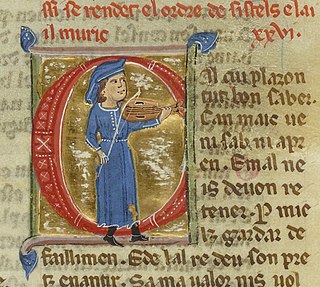
A troubadour was a composer and performer of Old Occitan lyric poetry during the High Middle Ages (1100–1350). Since the word troubadour is etymologically masculine, a female troubadour is usually called a trobairitz.

The Eighth Crusade was a crusade launched by Louis IX of France against the city of Tunis in 1270. The Eighth Crusade is sometimes counted as the Seventh, if the Fifth and Sixth Crusades of Frederick II are counted as a single crusade. The Ninth Crusade is sometimes also counted as part of the Eighth. The crusade is considered a failure after Louis died shortly after arriving on the shores of Tunisia, with his disease-ridden army dispersing back to Europe shortly afterwards.
Occitan literature is a body of texts written in Occitan, mostly in the south of France. It was the first literature in a Romance language and inspired the rise of vernacular literature throughout medieval Europe. Occitan literature's Golden Age was in the 12th century, when a rich and complex body of lyrical poetry was produced by troubadours writing in Old Occitan, which still survives to this day. Although Catalan is considered by some a variety of Occitan, this article will not deal with Catalan literature, which started diverging from its Southern French counterpart in the late 13th century.

Pons de Capduelh was a troubadour from the Auvergne, probably from Chapteuil. His songs were known for their great gaiety. He was a popular poet and 27 of his songs are preserved, some in as many as 15 manuscripts. Four of his cansos survive with musical notation.
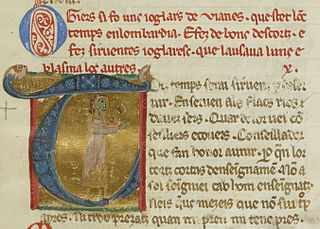
Guillem AugierNovella was a troubadour from Vienne in the Dauphinois who lived most of his adulthood in Lombardy and was active as a minstrel in the early or mid thirteenth century. According to his late thirteenth-century vida, "he composed good descartz and sirventes in the manner of jongleurs, in which he praised some and blamed others."

Guillem or Guilhem Figueira or Figera was a Languedocian jongleur and troubadour from Toulouse active at the court of the Emperor Frederick II in the 1230s. He was a close associate of both Aimery de Pégulhan and Guillem Augier Novella.
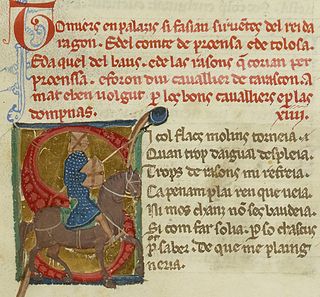
Tomier and Palaizi were two knights and troubadours from Tarascon, possibly brothers, and frequent comrades and co-composers.

Lanfranc Cigala was a Genoese nobleman, knight, judge, and man of letters of the mid thirteenth century. He remains one of the most famous Occitan troubadours of Lombardy. Thirty-two of his poems survive, dealing with Crusading, heresy, papal power, peace in Christendom, and loyalty in love. Lanfranc represented a tradition of Italian, Occitan-language trovatori who berated the Papacy for its handling of the Crusades.
Na Gormonda de Monpeslier or Montpelher was a trobairitz from Montpellier in Languedoc. Her lone surviving work, a sirventes, has been called "the first French political poem by a woman."

Peire d'Alvernhe or d'Alvernha was an Auvergnat troubadour with twenty-one or twenty-four surviving works. He composed in an "esoteric" and "formally complex" style known as the trobar clus. He stands out as the earliest troubadour mentioned by name in Dante's Divine Comedy.
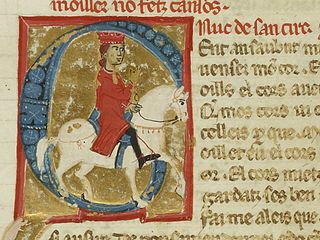
Uc de Saint Circ or Hugues (Hugh) de Saint Circq was a troubadour from Quercy. Uc is perhaps most significant to modern historians as the probable author of several vidas and razos of other troubadours, though only one of Bernart de Ventadorn exists under his name. Forty-four of his songs, including fifteen cansos and only three canso melodies, have survived, along with a didactic manual entitled Ensenhamen d'onor. According to William E. Burgwinkle, as "poet, biographer, literary historian, and mythographer, Uc must be accorded his rightful place as the 'inventor' (trobador) of 'troubadour poetry' and the idealogical trappings with which it came to be associated."
Guilhem d'Autpol or Daspol was a troubadour from Hautpoul in the Languedoc. He wrote four works that survive, three dwelling on intensely religious themes. There exists some evidence internal in his songs that he was a jongleur early on.
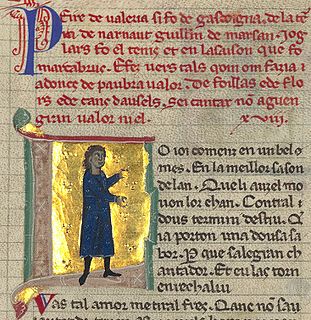
Peire de Valeira, Valeria, or Valera was a Gascon troubadour. Since troubadour poetry probably originated in northwest Aquitaine and first spread—within a generation—south into Gascony, Peire was one of the earliest troubadours. Only two of his poems survive, one canso and one cobla.
Gavaudan was a troubadour and hired soldier (soudadier) at the courts of both Raymond V and Raymond VI of Toulouse and later on in Castile. He was from Gévaudan, as his name implies. He wrote moralising lyrics, either religious or political, and ten of his works survive, including five sirventes, two pastorelas, one canso, one planh for an anonymous domna (lady), and one Crusade song. He is sometimes clumped in a primitive Marcabrunian "school" of poetry alongside Bernart Marti, Bernart de Venzac, and Peire d'Alvernhe. He developed a hermetic style, combining elements of the trobar ric and trobar clus.

Gui de Cavalhon, Cavaillo, or Gavaillo was a Provençal nobleman: a diplomat, warrior, and man of letters. He was probably also the Guionet who composed tensos and partimens with Cadenet, Raimbaut de Vaqueiras, Mainart Ros, Pomairol, and a certain Guillem.
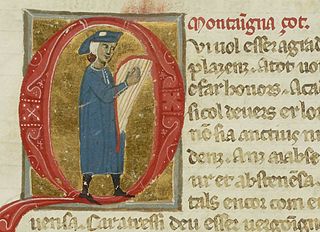
Guilhem (de) Montanhagol was a Provençal troubadour, most likely active in Toulouse, but known in the courts of Provence, Toulouse, Castile, and Aragon. Guilhem left behind seven cansos and six sirventes. He also left behind one tenso with Sordello and his total surviving output comes to fourteen pieces.
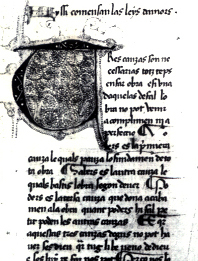
The Consistori del Gay Saber was a poetic academy founded at Toulouse in 1323 to revive and perpetuate the lyric poetry of the troubadours.

Guillem de Balaun was the castellan of Balazuc and a troubadour from the region around Montpellier. In his vida, which has the characteristics of a razo because it sets the background for the song Lo vers mou mercejan vas vos, he is described as "learned" (adretz).

Bernart Alanhan de Narbona was a minor troubadour probably from Narbonne. He left behind only one song, No posc mudar qu'eu no diga, a sirventes about the loss of Jerusalem to the Saracens, though it was not classified as a Crusade song in the seminal work on the genre by Kurt Lewent (1905).